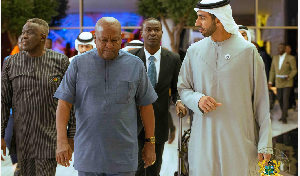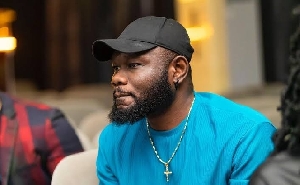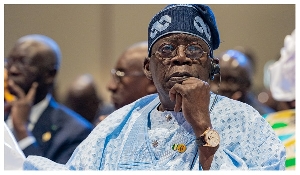In exactly 38 days, thus on 18th October, 2007, we will witness the second anniversary of the passing of Buipewura Chinchanko II of the Buipe Traditional Area of the Gonjaland Traditional Council of Northern Region. Two years ago, the late chief joined his ancestors after 19 long years (1986 – 2005) of dedicated service to his people, during which major developments in the area of education, health, sanitation and rural development culminated in the creation of the Central Gonja District with its Capital in Buipe upon his petition to the Government.
It is ironic that while the late Buipewura was a man of peace and a development advocate and enjoyed tremendous goodwill from the broad masses of the people, the period following his departure has become some of the most controversial in recent Gonjaland history. I don’t think any one in Gonjaland would remember any time in history when the Buipe skin has remained unoccupied for more than three weeks. The founders of our traditions would not recognise the skins they left behind; just because two brothers have decided to clean their dirty linens in the market place.
While a lot has been said about the causes of this unfortunate state of affairs and perhaps how to deal with it; not much is known about the cost to the community of the long absence of a chief. That is the gap this article seeks to close.
The biggest cost to us as a people of this unfortunate state of affairs is the dent it leaves on our image. Frankly, it is not enviable in modern society to be regarded as flash point or a troubled spot, much less to be regarded as a violent people. Even though, it has to be said, that the protagonists in the Buipe chieftaincy dispute have not engaged in any violence so far, to be constantly living under a tenuous peace is bad enough. To not have a chief for nearly two years because of frivolous posturing speaks volume of our commitment or lack of it to the development of our community.
The cost in time and financial resources used in the litigation of the matter, first in the Yagbonwura’s palace, then to the Tamale High Court and now at the Regional house of chiefs in Tamale is enormous, considering the poverty levels in the community. Altogether, it might outstrip the “Gross Domestic Product (GDP)” of the village. As the people involved in this litigation are not some of the wealthiest one can find, I wonder what the knock-on effect would be on the education of innocent children, as parents sacrifice books and uniform for litigation fees or loans to litigants in order to keep their acquaintances or not to be regarded as saboteurs.
The cost to development is enormous, if we consider for example that the petition for the creation of the Central Gonja District was made by the late Buipewura, the first Junior Secondary School Block in the village was built by communal labour under his leadership and the first All Girls Senior Secondary School was initiated by the Methodist Church through his efforts. Has any chief been leading the community in this direction in the last two years? I doubt very much. This is a price we don’t realise we are paying.
The current polarisation of the community is likely to turn chronic if the matter is not resolved soon enough. In the end the community that once rallied behind their chief to provide their major needs such as schools through communal labour may become so deeply polarised that such communal spirit may be gone forever. And the next chief may have great difficulty mobilizing the people for any meaningful development. As chieftaincy no longer has the coercive force it used to have in colonial times, a chief who does not have the support of the majority of his people is as good as absent.
In the Ghanaian context, the chief is also the arbitrator in chief of the community and under his supervision, the traditional Ghanaian justice system which is based on appeasement rather than punishment is upheld. Without a chief for the last two years, most disputes would be ending up in the orthodox justice system, (in theory at least) which operates on the basis of punishment.
In Gonjaland tradition when the Overlord of the Gonjaland Traditional Area, the Yagbonwura dies, it is the Buipewura who is first informed by the presentation of the late Yagbonwura’s walking staff, his royal sandals and his favourite horse to the Buipewura. It is the Buipewura again who “nominates” the next Yagbonwura and appoints the Kagbapewura to perform the enskinment. The question every one in Gonjaland must ponder over is: what happens when, touchwood, the current Overlord dies before a new Buipewura is enskined? Are we going to wait until we find a new Buipewura or we are going to circumvent the customs? Are we prepared for such unprecedented dislocation in our time-test traditions? For those who think we can sit back and allow the house of Chiefs to keep going on and on with their ridiculous adjournments, let them think of what it is likely to cost us. Perhaps, when it happens we could just say: “well, to hell with customs!” Of course we cannot, because, it is the same customs the people seeking to be chief are meant to come and protect, and if they are prepared to sacrifice those very customs on the alter of personal ego; then I dare say they have no business being chiefs.
Obviously the cost to our community as a result of this unnecessarily prolonged succession dispute is incalculable. However, because much of it is of long-term, rather than immediate consequences, we have tended to overlook it. Well, not any more.
I would therefore appeal to the Regional House of Chiefs to desist from prolonged adjournments of the case and make a decision as soon as possible to make way for the people to install a new Chief, whoever that might be. Buipe needs a chief, and very urgently too. We can no longer afford to wait. This is assuming that the chief we will have will be peaceful, innovative, development oriented and seek the interest of the community rather than his own interest.















